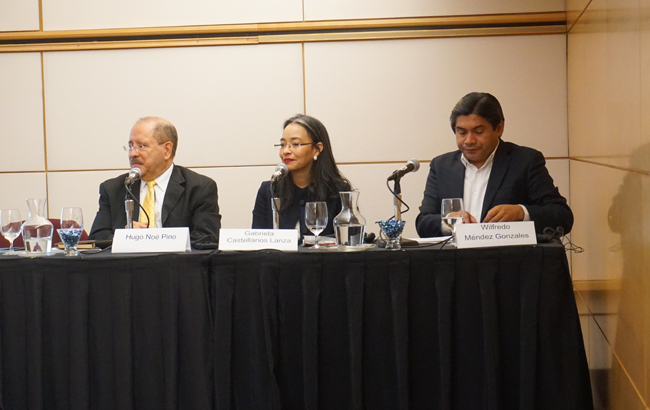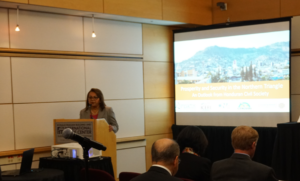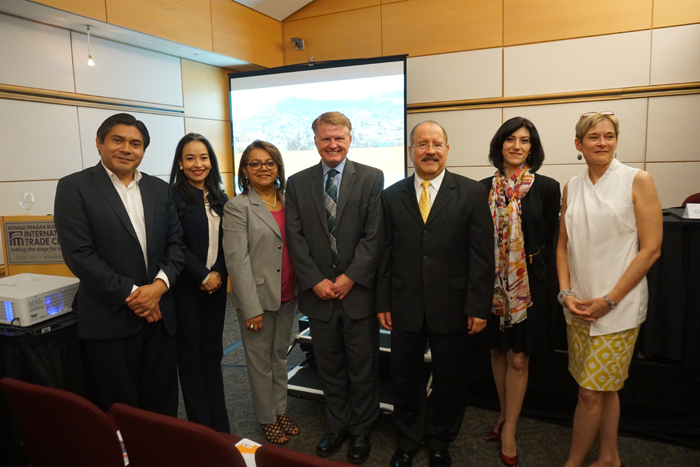Imagine looking your 8-year old child in the eyes, with hands on their shoulders saying, “You have to go. You have to go.” You’re not talking about going to the dentist, or to school, or to music practice. You’re talking about going to America. Alone.
In 2014, 46,000 children under 18 left their families in Honduras to seek refuge in the United States at the height of what Wilfredo Mendez Gonzales, the Executive Director of the Center for Research and Promotion of Human Rights (CIPRODEH), called a “humanitarian crisis.” “To migrate is a human right,” Mr. Mendez said, “but no one should leave their country because of violence or poverty…we have to remember that 8-year-old with a little bag of misery on his back.”

Speakers at the “Prosperity and Security in the Northern Triangle” event: Wilfredo Mendez Gonzales, CIPRODEH [Right]; Gabriela Castellanos Lanza, CNA [Center]; Hugo Noe´ Pino, CEFI [Left]
Impactos works to increase transparency and accountability in public institutions, increase citizen participation and social empowerment, and reduce violence. The program partners with more than 30 civil society organizations to advance these goals and the commitments of the Open Government Partnership and the Alliance for Prosperity.
Mr. Mendez focused on the human rights perspective when addressing security issues. The crisis of unaccompanied minors fleeing the country has not diminished, he explained, because the causes – poverty and violence – still exist.
“In the Northern Triangle, we have been united by tragedy. We need to commit to helping those most in need of our work… We have a great opportunity to move forward.” —Wilfredo Mendez Gonzales
Hugo Noe´ Pino focused on structural issues that are inhibiting real progress, from economics to rule of law. Mr. Noe´, a senior economist at the Central American Institute of Fiscal Studies (ICEFI) and former Honduran Ambassador to the United States, noted that 60% of Hondurans are under employed or unemployed, and 40% of its citizens live in extreme poverty. Honduras has still not recovered from the 2009 economic crisis. “The country is highly dependent on what happens globally, especially in the United States,” Mr. Noe´ explained. Thirty-five percent of exports go to the U.S. And while the U.S. is the main investor in Honduras, that investment pales in comparison to the economic contribution of remittances.
For every $1 of foreign direct assistance, $3-$4 of remittances enter the country. Mr. Noe´ addressed the financial threat that comes with the fear of millions of Hondurans being deported from the United States, positing that “If we lose remittances, the country would face serious economic and security challenges.”
Mr. Noe´ also noted that the prevalence of impunity must be addressed. “If we want to build a democracy, we need rule of law and resources to strengthen our institutions. I hope that international assistance will play an instructive role in helping us overcome these structural issues,” he added.
Rule of law and impunity was also addressed by Gabriela Castellanos Lanza, a lawyer specializing in human rights and the Executive Director of the National Anti-Corruption Council (CNA), an independent civil society organization dedicated to preventing, deterring, and combating corruption.
Weak instutions or those that are politicized continue to be an issue- but Honduras can be un estado de derecho @USAIDHonduras #CSHonduras pic.twitter.com/nws01Q0bsX
— Counterpart International (@counterpartint) May 25, 2017
Ms. Castellanos focused on the need to address corruption—something that had not been a priority for the Honduran Government until just last year. In 2016, the Mission to Support the Fight Against Corruption and Impunity in Honduras (MACCIH) was formed in an agreement between the government of Honduras and the Organization of American States (OAS).
However, challenges remain. Ms. Castellanos noted that of the 901 cases involving corruption filed with the Judiciary, only 191 trials have gone forward. “There is great delay in matters of corruption…It is a very difficult, complicated reality.”
“We are forced to ask ourselves, is Honduras a country of rule of law? Technically, yes, but respect for rule of law and accountability, we don’t see this.” Ms. Castellanos said.
“There is only one way out. We must remain committed and have the voice of civil society heard and our rights respected. When citizens learn how they can deal with corruption, they participate more, they become empowered.” — Gabriela Castellanos Lanza
Steve Griner, Director of the Department of Sustainable Democracy and Special Missions of the OAS, echoed many of the comments of the Honduran civil society leaders. “The impact of corruption is significant and civil society organizations are working on it, and the government is taking positive steps, albeit small,” he said. “MACCIH was a tangible achievement, and civil society and government need to continue working together.” Mr. Griner noted that additional resources were needed to address the variety and depth of these challenges and leave behind a strengthened rule of law in Honduras.

Dina Eguigure (Counterpart), speaking about the Impactos program.
Dina Eguigure, Counterpart’s Chief of Party in Honduras and event moderator, also emphasized the need for rule of law, transparency, and accountability. Speaking on behalf of her partners, she said, “We are passionate about our country. We are joining together to emphasize the need to focus on people, not just security and the economy. This is a call to action.”
Ms. Eguigure underscored that achieving the Alliance for Prosperity and Open Government Partnership goals would be impossible without a commitment of additional resources from both the Honduran government and the international community.
“The Impactos program and its partner organizations are committed to working together to strengthen public institutions’ ability to respond to the needs of citizens.” —Dina Eguigure
Ms. Eguigure concluded by recognizing the support of USAID in the efforts underway in Honduras: “Thank you USAID for your trust. It is a collective effort.”

[Right to Left] Joan Parker, Counterpart International President and CEO; Anna Sahakyan, Counterpart LAC Regional Director; Hugo Noe´ Pino (ICEFI); Steve Griner (OAS); Dina Eguigure (Counterpart); Gabriela Castellanos Lanza (CNA); Wilfredo Mendez Gonzales (CIPRODEH)
Impactos is a five-year initiative funded by USAID and implemented by Counterpart International, in partnership with the International Center for Not-for-Profit Law (ICNL) and Management Systems International (MSI).


